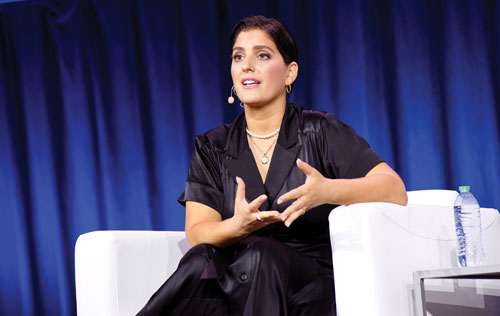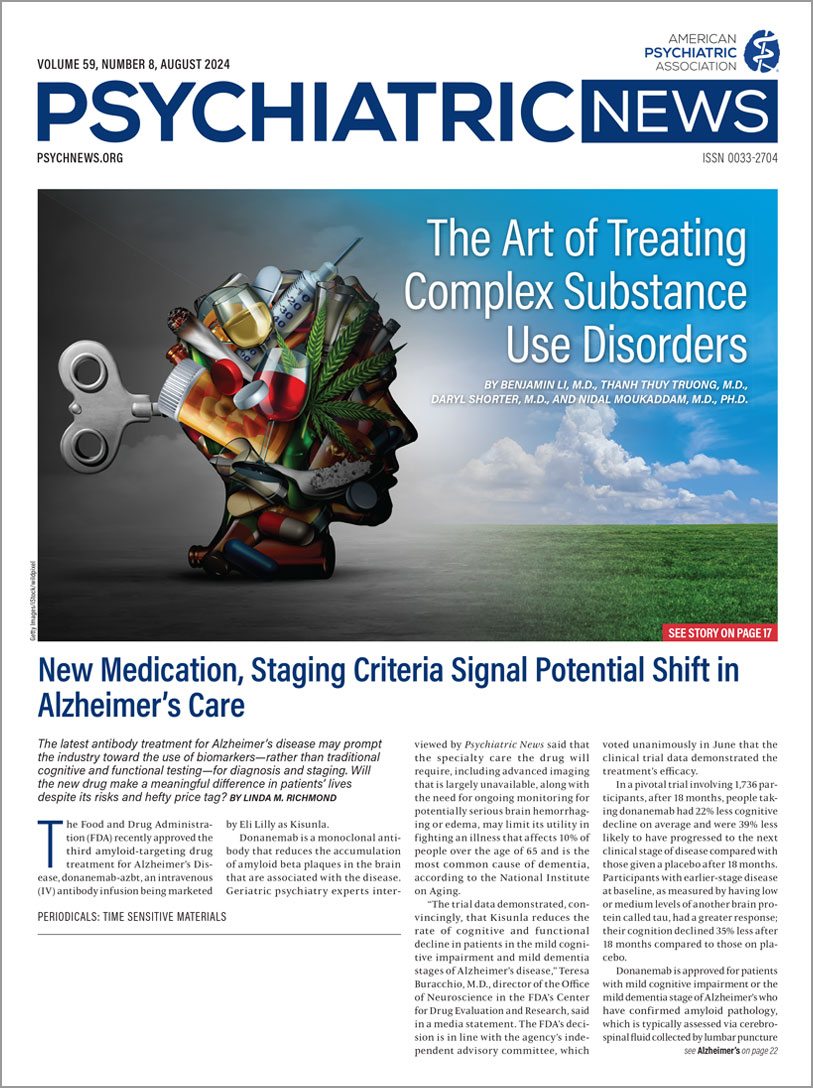Mental health care is increasingly being integrated into treatment for cancer, and the importance of such care may even surpass that of the medical treatments, according to Emmy-award winning journalist, artist, advocate, and cancer warrior Suleika Jaouad, who spoke at an Annual Meeting plenary session.
Jaouad discussed her mental health challenges sparked by a multi-year battle with cancer and how improvements in mental health care for patients with life-threatening illnesses are giving her new hope. She also spoke about the importance of giving love to others and “investing in community” along her recovery journey.
Jaouad was only 22 years old when she was first diagnosed with acute myeloid leukemia. After enduring four years of cancer treatment, including one year of inpatient hospitalization, several rounds of chemo, a clinical trial, and a bone marrow transplant, Jaouad said she knew she was lucky to finally be declared “cancer free.” In fact, among the ten young “cancer comrades” she befriended in the hospital, she was one of only three who survived, she said.
Despite her luck, she felt more deeply lost and isolated than she had ever been in her life, she told the audience. “I felt such intense shame. I was alive after all—I was cured—yet I was struggling with anxiety and depression that it made it such that I could barely get out of bed every day.” She also suffered from night terrors, for which she was offered just a sleeping pill.
At that time, there were no programs available to help her with reentry to life. “Not once in those four years [of treatment] do I ever remember a single person asking me about my mental health. I don’t remember being asked about anxiety, depression, suicidal ideation,” Jaouad said. “The isolation I felt during those four years of treatment was far more painful than even the cancer itself.”
A Road Trip Toward Recovery
On her journey to better mental health, one key to her recovery has been her mission to “invest in community,” she said. She wrote about her experience with cancer for the New York Times column “Life, Interrupted,” for which she later won an Emmy Award. Later, she learned to drive and embarked on a 15,000-mile solo road trip around the country to meet the many people who wrote in response to her column. She even wrote about her journey of healing in a book titled “Between Two Kingdoms: A Memoir of a Life Interrupted,” now a bestseller.
Jaouad has made many new friends, including that of Texas death-row inmate Quintin Jones, who had spent more than half his life in solitary confinement. He spent 23 hours a day, alone in his cell, for the better part of three decades, she said. What kept him going? Board games crafted from scraps of paper that were played by calling out to fellow death-row inmates through the walls. Jones also formed pen-pal friendships with people ages 8 to 80 from around the world, which also gave him a sense of connection and allowed him to use his imagination, she said.
When Jaouad’s hard-fought campaign to commute Jones’ death sentence was not successful, she waged a campaign for the public to send him more letters. In the final weeks of Jones’ life, he received hundreds and hundreds a day. On the day of his execution, Jaouad and her husband—musician Jon Batiste—spent hours talking with Jones by phone, telling stories, playing music, she recalled.
Jones told her that day that he had never felt more loved in his life, that he had never been a recipient of the kind of love he felt from all the letters he received, she recalled. “Ultimately, at the end of our lives, if we can say we’ve done one thing well, let it be that we loved,” Jaouad said.
Better Mental Health Care Received
After a decade in remission, Jaouad learned in November 2021 that her leukemia had returned. She underwent another stem cell transplant, involving more months in a medical isolation unit. Although the treatment was a success, this time she learned she must remain in treatment indefinitely. “Learning to navigate that heightened sense of uncertainty has become my daily work.”
Jaouad said she doesn’t believe that she is any more innately resilient than anyone else, but one thing that is giving her new hope is the vastly improved mental health support she is receiving during her current cancer treatment. For example, when she experienced bone marrow transplant complications that left her in excruciating pain, ketamine therapy dramatically reduced both the physical and psychic pain that had accompanied it in the past, she said.
Last year during a regimen of high-dose steroids, she began having night terrors and waking up to deeply scratched skin. As before, she was offered sleeping pills, but this time also access to a cognitive-behavioral therapy program aimed at resolving sleep disturbances. “After six sessions with [the therapist], I haven’t had a night terror since,” she said. She gives her therapists, caregivers, nurses, social workers, and physicians much credit.
“Though my cancer prognosis is far worse, my sense of well-being is so much greater,” she said. “So much has changed in the last decade. Being the recipient of that progress gives me a lot of hope, but there’s still so much work that we must do.”
It is clear that Jaouad plans to continue to be an advocate and an inspiration to people in need for the rest of her life. ■

